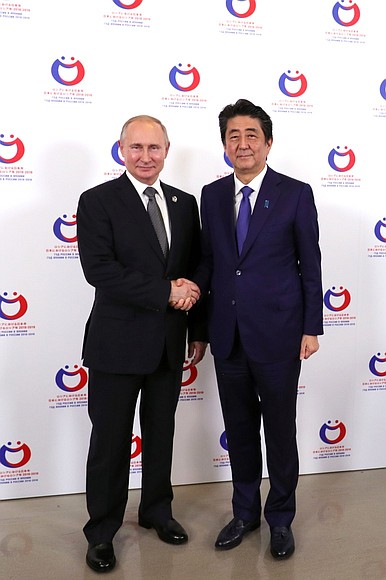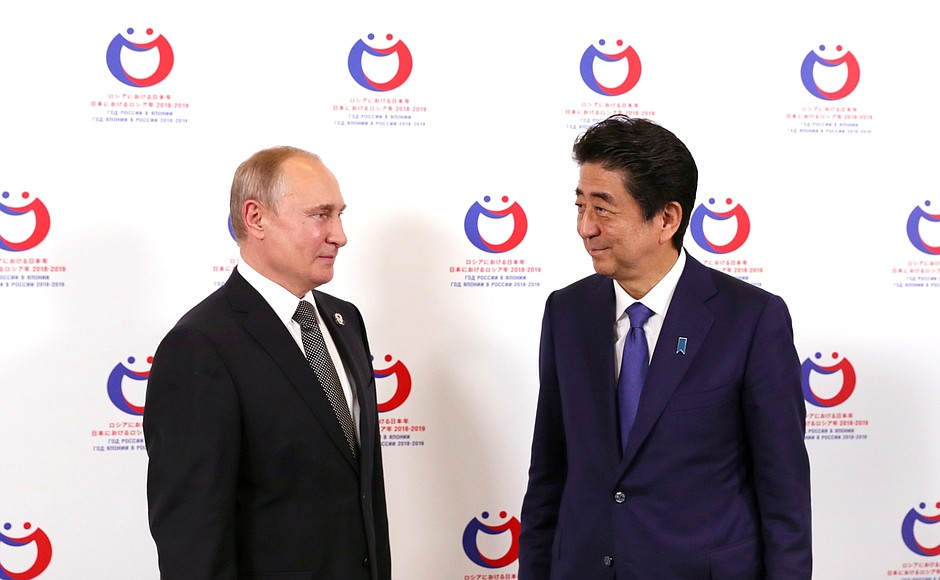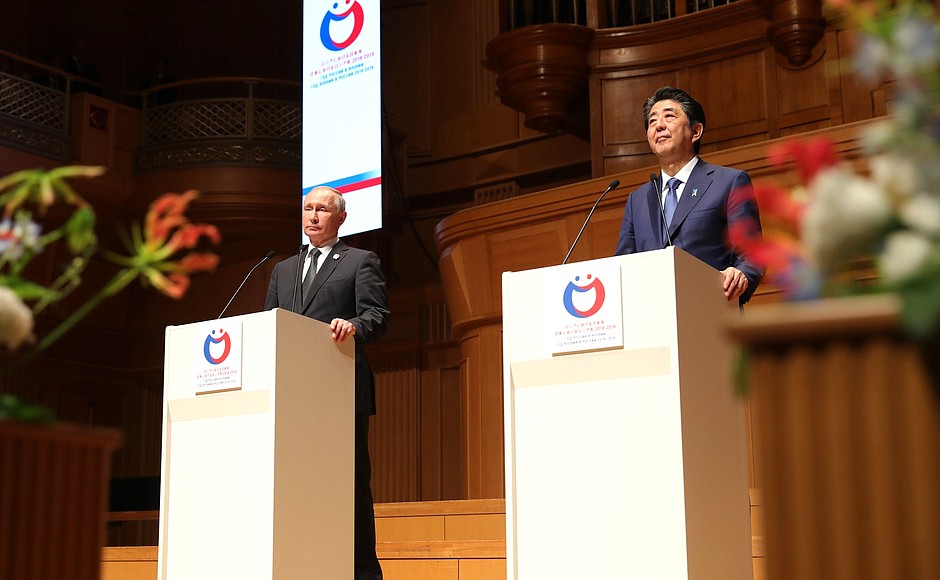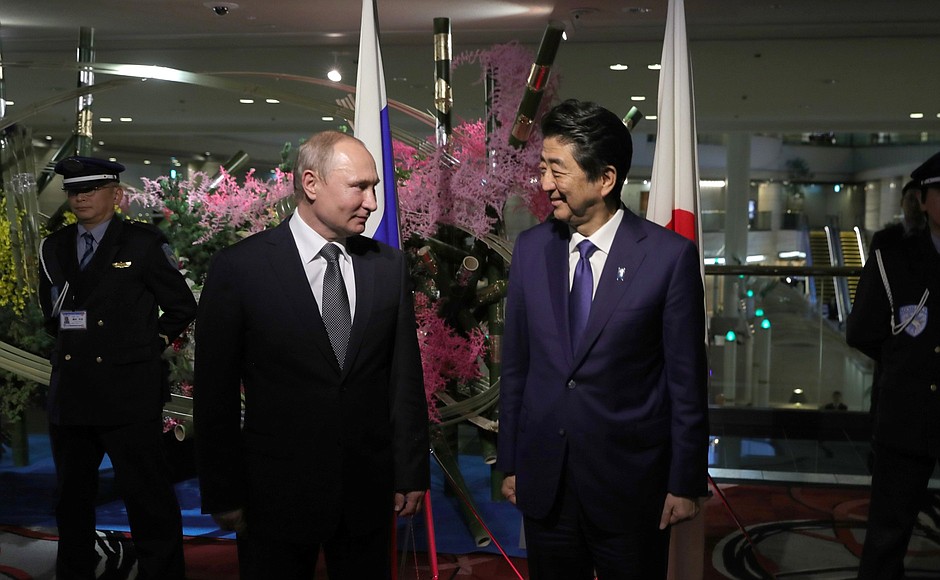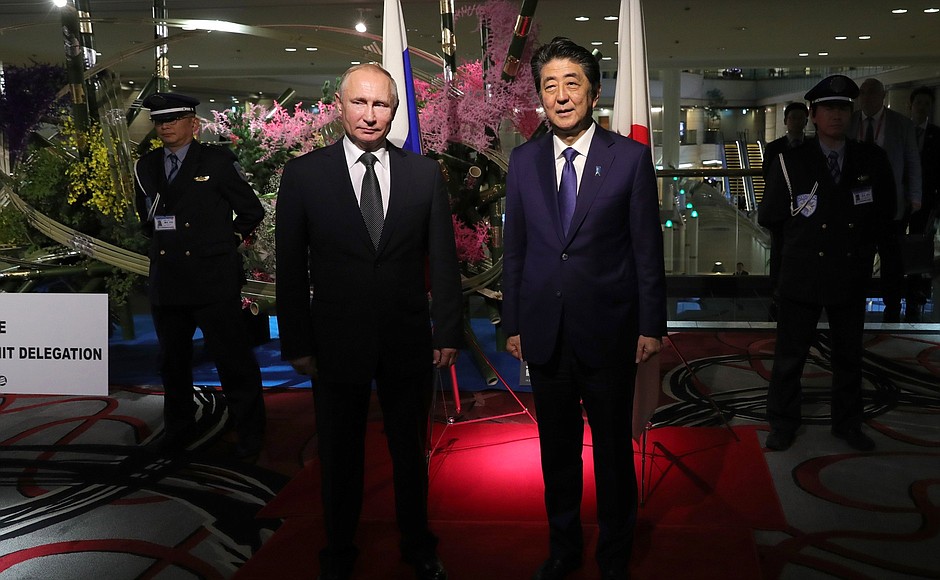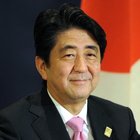Vladimir Putin attended the closing ceremony for the Cross Years of Russia and Japan.
Prime Minister of Japan Shinzo Abe also attended the event.
* * *
Prime Minister of Japan Shinzo Abe (retranslated): Mr President, ladies and gentlemen,
In May of last year, together with President Putin we held a ceremony in the Bolshoi Theatre to launch the Cross-Year of Russia and Japan.
A year has passed, filled with diverse events held in both countries to help our peoples learn about the beauty of each other.
Over 600 events held in Russia were attended by over 1.5 million people. They include a guest tour by the Kabuki theatre, demonstration horseback archery performances and martial art exchanges. All these events demonstrated very well the appeal of Japan.
People in Japan could get an insight into the essence of Russian culture, which is the pride of the world, such as an exhibition of paintings from the Pushkin Museum of Fine Arts and performances by the Mariinsky ballet.
Over this year, the people of Japan and Russia demonstrated a growing interest and affinity for each other.
Today we have invited here those who worked selflessly to promote ties with Russia. I would like to express my heartfelt gratitude to all those who helped us during the cross-year and my joy over the successful completion of the Cross-Year of Russia and Japan.
The cross-year ends today, but we decided together with President Putin to hold the first ever Japanese-Russian year of interregional exchange to take bilateral contacts to the outmost regions of our countries. Every region in our two countries has its inimitable traditions and distinctive features.
In conclusion, I would like to express hope in the continued development of ties between our countries.
Thank you.
President of Russia Vladimir Putin: Mr Prime Minister, ladies and gentlemen,
Today’s ceremony is the final event of the Year of Russia in Japan and the Year of Japan in Russia and a chance to review the huge job we did together to promote humanitarian cooperation aimed at bringing our peoples closer together.
The programme of the cross-year was truly attractive, grand and filled with interesting events. It covered nearly all spheres of our bilateral relations, including culture, the arts, education and tourism.
Russia and Japan have successfully held over 700 different events, including exhibitions of works of art from Russian and Japanese museums, film and theatre festivals, musical tours, while sailing ships have also called at both countries’ ports.
Joint projects in the field of healthcare, cutting-edge technology and municipal administrations have been implemented.
Russia has successfully hosted performances given by Japan’s Nippon Budokan Martial Arts House.
In April, Japanese tourists conducted a fact-finding tour of the Trans-Siberian Railway along the Following the Sun route and travelled across all of Russia, from Vladivostok to Moscow.
Last week, St Petersburg was the venue of a workshop on restoring Japanese swords from Russian museums’ collections. This is the first such unique event to have taken place in our country.
The Ambassador of Japan to Russia has just pointed out that a Japanese pianist has come second at the International Tchaikovsky Competition. But this is not linked with events of our cross-years. I sincerely congratulate this Japanese musician on his landmark victory from the bottom of my heart, and I wish him every success. This was entirely his own doing.
The Japanese audience was really interested in the Russian figure skating team’s public training sessions. The Vaganova Academy of Russian Ballet organised a number of performances in Tokyo and some other Japanese cities, including Osaka. These events highlighted the rich traditions of Russian choreography.
I would like to note that many of these performances involved outstanding cultural workers and artists of our countries, prominent specialists in the field of education, science and sports, members of parliament and creative young individuals.
Today, we are witnessing performances given by very young talented people. Young soloists from the Moscow Chamber Choir and the Japanese Children’s Choir will perform both countries’ folk songs, and they will also display their professionalism while performing classical music.
It goes without saying that the cross-years have provided a serious impulse to expanding the entire range of bilateral relations, have helped establish direct contacts between people and have, in general, facilitated stronger neighbourly ties between our countries.
I would like to thank all the participants in these numerous events from the bottom of my heart. And, as Shinzo [Abe] has just said, we have agreed to launch a new project called the Year of Russian-Japanese Inter-Regional and Twin City Exchanges.
I am particularly happy to say this here in Osaka, the twin city of St Petersburg, my home city. This important initiative is called on to impart a new quality to diverse mutually beneficial ties between Russian and Japanese regions.
Most importantly, work will continue to form an atmosphere of friendship and cooperation between our countries and peoples.
Thank you. Arigato.
